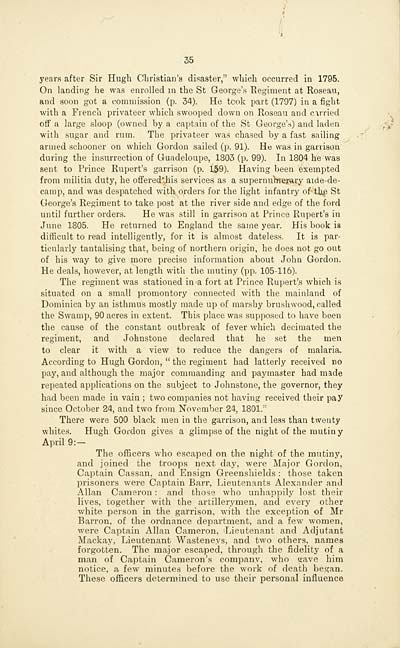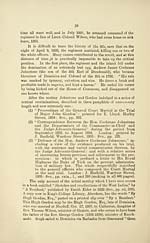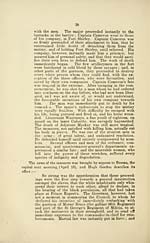Download files
Complete book:
Individual page:
Thumbnail gallery: Grid view | List view

35
years after Sir Hugh Christian's disaster," which occurred iu 1795.
On landing he was enrolled in the St George's "Regiment at Roseau,
and soon got a commission (p. 34). He took part (1797) in a fight
with a French privateer which swooped clown on Roseau and carried
off a large sloop (owned by a captain of the St George's) and laden
with sugar and rum. The privateer was chased by a fast sailing
armed schooner on whieh Gordon sailed (p. 91). He was in garrison
during the insurrection of Guadeloupe, 1803 (p. 99). In 1804 he was
sent to Prince Rupert's garrison (p. 159). Having been exempted
from militia duty, he offereduhis services as a supernumerary aide-de-
camp, and was despatched with orders for the light infantry of- the St
George's Regiment to take post at the river side and edge of the ford
until further orders. He was still in garrison at Prince Rupert's in
June 1805. He returned to England the same year. His book is
difficult to read intelligently, for it is almost dateless. It is par-
ticularly tantalising that, being of northern origin, he does not go out
of his way to give more precise information about John Gordon.
He deals, however, at length with the mutiny (pp. 105-116).
The regiment was stationed in a fort at Prince Rupert's which is
situated on a small promontory connected with the mainland of
Dominica by an isthmus mostly made up of marshy brushwood, called
the Swamp, 90 acres in extent. This place was supposed to have been
the cause of the constant outbreak of fever which decimated the
regiment, and Johnstone declared that he set the men
to clear it with a view to reduce the dangers of malaria.
According to Hugh Gordon, " the regiment had latterly received no
pay, and although the major commanding and paymaster had made
repeated applications on the subject to Johnstone, the governor, they
had been made in vain ; two companies not having received their pay
since October 24, and two from November 24, 1801."
There were 500 black men in the garrison, and less than twenty
whites. Hugh Gordon gives a glimpse of the night of the mutin y
April 9: —
The officers who escaped on the night of the mutiny,
and joined the troops next day, were Major Gordon,
Captain Cassan, and Ensign Greenshields : those taken
prisoners were Captain Barr, Lieutenants Alexander and
Allan Cameron : and those who unhappily lost their
lives, together with the artillerymen, and every other
white person in the garrison, with the exception of Mr
Barron, of the ordnance department, and a few women,
were Captain Allan Cameron, 'Lieutenant and Adjutant
Mackay, Lieutenant Wasteneys, and two others, names
forgotten. The major escaped, through the fidelity of a
man of Captain Cameron's company, who save him
notice, a few minutes before the work of death began.
These officers determined to use their personal influence
years after Sir Hugh Christian's disaster," which occurred iu 1795.
On landing he was enrolled in the St George's "Regiment at Roseau,
and soon got a commission (p. 34). He took part (1797) in a fight
with a French privateer which swooped clown on Roseau and carried
off a large sloop (owned by a captain of the St George's) and laden
with sugar and rum. The privateer was chased by a fast sailing
armed schooner on whieh Gordon sailed (p. 91). He was in garrison
during the insurrection of Guadeloupe, 1803 (p. 99). In 1804 he was
sent to Prince Rupert's garrison (p. 159). Having been exempted
from militia duty, he offereduhis services as a supernumerary aide-de-
camp, and was despatched with orders for the light infantry of- the St
George's Regiment to take post at the river side and edge of the ford
until further orders. He was still in garrison at Prince Rupert's in
June 1805. He returned to England the same year. His book is
difficult to read intelligently, for it is almost dateless. It is par-
ticularly tantalising that, being of northern origin, he does not go out
of his way to give more precise information about John Gordon.
He deals, however, at length with the mutiny (pp. 105-116).
The regiment was stationed in a fort at Prince Rupert's which is
situated on a small promontory connected with the mainland of
Dominica by an isthmus mostly made up of marshy brushwood, called
the Swamp, 90 acres in extent. This place was supposed to have been
the cause of the constant outbreak of fever which decimated the
regiment, and Johnstone declared that he set the men
to clear it with a view to reduce the dangers of malaria.
According to Hugh Gordon, " the regiment had latterly received no
pay, and although the major commanding and paymaster had made
repeated applications on the subject to Johnstone, the governor, they
had been made in vain ; two companies not having received their pay
since October 24, and two from November 24, 1801."
There were 500 black men in the garrison, and less than twenty
whites. Hugh Gordon gives a glimpse of the night of the mutin y
April 9: —
The officers who escaped on the night of the mutiny,
and joined the troops next day, were Major Gordon,
Captain Cassan, and Ensign Greenshields : those taken
prisoners were Captain Barr, Lieutenants Alexander and
Allan Cameron : and those who unhappily lost their
lives, together with the artillerymen, and every other
white person in the garrison, with the exception of Mr
Barron, of the ordnance department, and a few women,
were Captain Allan Cameron, 'Lieutenant and Adjutant
Mackay, Lieutenant Wasteneys, and two others, names
forgotten. The major escaped, through the fidelity of a
man of Captain Cameron's company, who save him
notice, a few minutes before the work of death began.
These officers determined to use their personal influence
Set display mode to:
![]() Universal Viewer |
Universal Viewer | ![]() Mirador |
Large image | Transcription
Mirador |
Large image | Transcription
Images and transcriptions on this page, including medium image downloads, may be used under the Creative Commons Attribution 4.0 International Licence unless otherwise stated. ![]()
| Histories of Scottish families > Gordons and Smiths at Minmore, Auchorachan, and Upper Drumin in Glenlivet > (43) Page 35 |
|---|
| Permanent URL | https://digital.nls.uk/95712603 |
|---|
| Description | A selection of almost 400 printed items relating to the history of Scottish families, mostly dating from the 19th and early 20th centuries. Includes memoirs, genealogies and clan histories, with a few produced by emigrant families. The earliest family history goes back to AD 916. |
|---|

